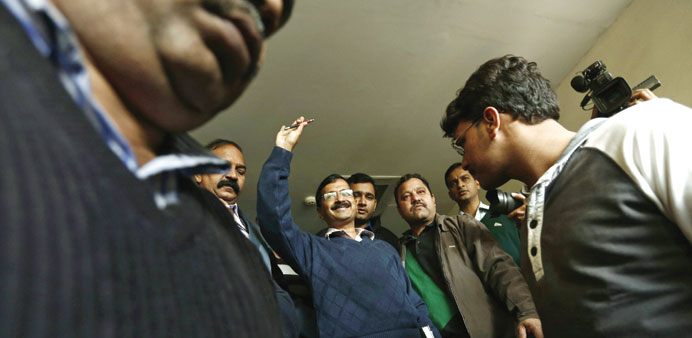Delhi Chief Minister Arvind Kejriwal leaves after addressing a news conference in New Delhi yesterday. Kejriwal said he has asked for legal cases to be filed against Mukesh Ambani and Veerappa Moily over pricing of gas.
Agencies/New Delhi
Delhi Chief Minister Arvind Kejriwal yesterday took on India’s wealthiest tycoon Mukesh Ambani, ordering a probe into allegations of price-fixing of gas supplies.
Kejriwal accused the billionaire of making “windfall gains” through his Reliance Industries Ltd (RIL) conglomerate.
Kejriwal’s government has initiated investigations into power companies and is trying to curb fuel prices, raising concerns the row could lead to widespread blackouts during India’s famously blistering summer.
The power plants use natural gas to generate electricity.
“We have asked the Anti-Corruption Bureau to probe the case,” Kejriwal, leader of the Aam Aadmi Party told a news conference. He has described himself as an “anarchist” and “political revolutionary.”
He said his government had ordered anti-corruption officials to file First Information Reports or FIRs against Oil Minister Veerappa Moily, former oil minister Murli Deora, Ambani and former industry regulator V K Sibal, among others.
An FIR obliges police to undertake an investigation.
Reliance at first promised to supply gas from its KG-D6 field off India’s east coast to utility NTPC Ltd at $2.3 per million British thermal units (mBtu) for 17 years, Kejriwal said.
But the price of gas was raised to $4.2 per mBtu when Deora took over as oil minister.
After Moily became oil minister, the national government approved in June a new formula for calculating gas prices that would almost double them from April 1 this year.
Kejriwal demanded the national government suspend the most recent rise pending an inquiry.
Reliance had no immediate comment, but has always denied charges of price manipulation involving its KG-D6 field, from which output has been falling for the past three years.
“The wells belong to us. If Reliance and Mukesh are not producing gas in order to create an artificial scarcity, then the government should look at giving these wells to the (state-run exploration company) ONGC and some other entity which can operate them and produce gas,” Kejriwal said.
The D6 block was expected to contribute up to 25% of gas for Asia’s third-largest economy but its lower-than-expected output has left the energy-hungry nation more dependent on expensive, imported liquefied natural gas (LNG) to fuel power and fertiliser plants.
The oil minister hit back at Kejriwal’s allegations and said people “should sympathise with his ignorance.”
“He doesn’t know how the government runs, norms are followed (in setting prices),” Moily told reporters.
He said he had taken a special interest to ensure that gas prices were reduced.
“It is not the question of Mukesh or Deora or anybody,” he said. There was a certain system for fixing prices and nothing was done without expert advice, he said.
“(Kejriwal) thinks that it’s just like taking water through a bucket from a well. He cannot take the oil like that.”
Reliance’s shares fell 2% on the allegations.
The populist politician accused the “gas lobby” of bribing both the Congress Party, which rules at the national level, and opposition parties to “keep quiet” over the alleged pricing conspiracy.
Kejriwal, who said he was acting on a complaint from “four senior persons,” accused RIL of creating an artificial shortage and thereby seeking to push up natural gas prices.
Kejriwal came to power in Delhi last December following state elections amid a wave of support among the lower and middle classes for his tough stance against corruption.
But his recent campaigns have taken on a radical tone, such as sleeping rough for a night on a Delhi street to press for police reforms.
He is planning to take on the major parties by fielding candidates in a national election due by May.
The Supreme Court last week staved off a threat until later this month by the NTPC utility to disconnect power supply because of an electricity distribution company’s arrears.
The Supreme Court observed at the time that Delhi’s power sector appeared to be in “anarchy.”

